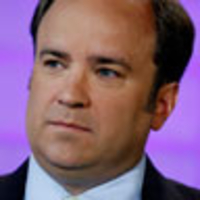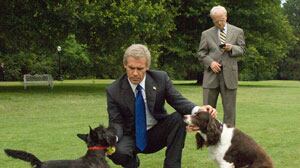
Many months ago, I came to grips with the fact that the Bush presidency did not turn out the way many of us who went to work for him had hoped. Maybe that’s why the initial strangeness of Oliver Stone’s W. quickly dissipated. Just like any other movie I might go see, I soon was leaning back in my chair with an open mind ready to be entertained. It was not long before Stone’s perspective on what happened piqued my curiosity.
If there is anything the 41st and 43rd presidents have in common, it is their shared contempt for psychoanalysis, or being put on the couch. Yet there are few things more important when choosing a president than looking beyond the candidates’ elaborately crafted political façades to understand what really drives them and makes them tick.
I won’t go as far as to borrow a line from Bush 43 and say, “Heck of a job, Stonie.” But I will borrow one from Bush 41 and say, “It’s good, not bad.”
The father-son dynamic Oliver Stone explores throughout W. is what I found most intriguing about his biopic. As the movie intermittingly flashes from past to present, the audience sees how the formative, early adult years of W (ably played by Josh Brolin) and the strained relationship with his father (James Cromwell) eventually come to shape his decision-making and governing style inside the White House, mostly as it relates to Iraq. The carefree young Bush inspires little confidence and much disappointment in the father, who disdains his son’s wild socializing, lack of intellectual vigor, and aimless drifting from job-to-job.
With competitive zeal, Bush sets out to outperform Poppy by learning from his political shortcomings. But his obsessive desire to achieve greatness pushes W to overreach, pursuing an idealistic and ambitious vision of defining his legacy by the spread of freedom in the Middle East that proves to be nothing but an elusive dream. In the end, the once cocksure president is left struggling to come to grips with reality.
That’s the story told by the film. But is it true? Here’s the judgment of one person who saw many—not all—of the real events as they unfolded.
At best, Stone’s interpretation is educated conjecture. He takes plenty of liberties with the facts, a story-telling strategy he considers justified in order to get at larger truths in a 2-hour movie. As a result, the real-life complexities of the characters and events are left unexplored.
The extent to which George W. Bush was driven by a desire to earn his father’s respect remains unknown. Getting inside someone’s head is not easy, even more so when it involves a member of the protective Bush clan. Those private father-son moments were just that—private—and neither 41 or 43 nor any other family member who might have been nearby has cared to share any insights into the relationship.

Nevertheless, I think it would be wrong to discount the relationship as insignificant. There has always been a certain element in the younger Bush that seeks to distinguish himself from his father. In real life as in the movie, he sought to avoid what he perceived as his father’s most costly political mistakes. He overcompensated to avoid being perceived as indecisive—which led him instead to be perceived as unwilling to acknowledge his mistakes and change. He overemphasized social issues to keep the base happy—taking focus away from issues of most concern to the vital center. And he overreached in trying to be bold and visionary—resulting in a unnecessary war that has dragged on far too long and been far too costly.
The movie also depicts W as politically astute and calculating, thanks largely to the help of his ever-present political mentor Karl Rove (Toby Jones). In the movie, Bush’s every move has underlying political motives.
For example, during a war council meeting in the Situation Room, Richard Dreyfuss’ Cheney fervently works to persuade the president about the need to invade Iraq for the sake of its oil reserves. W shifts the focus to selling the conflict to the public. For the “average Joe,” Bush asserts, “It’s not about oil. It’s about 9/11 and terrorists.” Brolin’s Bush is always thinking about how best to sell his policies to the public, intellectual honesty aside.
This rings true. President Bush was always concerned about how we would sell the “big items.” The White House Iraq Group (WHIG) was specifically formed to market war to the American people. Too often, candor took a back seat to making the most compelling case.
Overall, as should be expected from the high-caliber cast, the acting was fabulous. Brolin rightly deserves kudos for his portrayal of Bush. He has the swagger down, and does a decent job on Bush’s voice and gestures. The president’s eating habits were overdone, but not completely off the mark (you will know what I mean when you see the movie). The attractive and engaging Elizabeth Banks plays a charming Laura Bush. Dreyfuss nails his inner Cheney, a conniving vice president who believes the president’s wartime powers are virtually unlimited and that the ends justify the means. Jeffrey Wright does an excellent job capturing Colin Powell’s strong dissenting voice, if not his physical presence. The most unflattering portrayal was that of Condi Rice, caricatured by Thandie Newton as a mere yes–woman, which is excessively denigrating but not entirely without basis.
There are a number of inaccuracies in the movie, some grounded in Stone’s satirical impulse. (Maybe I was too close to the real-life situations to laugh at those moments.)

At times, Brolin’s Bush comes across borderline village idiot. “Iran is not Iraq, and Iraq is not Iran. I know that much,” W declares at one point to his assembled war council. In a press conference, he refers to a journalist of Asian ethnicity as “Miss China.” The George W. Bush I know is no rocket scientist (as he’d be the first to admit), but he’s no simpleton either.
Stone also exaggerates in painting Bush as a simple-minded born-again Christian. President Bush is a man of deep personal faith who may have felt a calling to enter politics, but he never came across to me as presuming to know God’s will. Nor does he consider himself an evangelical Christian or fundamentalist Baptist (though along with Rove he placed a high priority on keeping that wing of the Republican base happy).
I also felt it was grossly unfair to portray Bush as merrily oblivious and somewhat smug when visiting wounded soldiers at a military hospital. Having been at President Bush’s side during such visits, I know they were somber, emotionally-draining moments for him. They were also probably the only time I ever noticed self-doubt creep into his eyes, however fleetingly, as he confronted the terrible human costs of his misguided, instinctive decision to rush into an unnecessary war.
But W. is a drama, not an historical documentary. Stone tries to play it fairly straight. Even if he misses the mark at times, he deserves credit for the glimpses of inner truth he provides, which can only be instructive, especially as we prepare to elect a new president.
My guess is the most vocal Bush critics will view Stone’s account as too soft on Bush and his top advisers, while Bush’s chief advocates will ignore and dismiss it. But I think the average Joe just might find it entertaining and thought-provoking. I won’t go as far as to borrow a line from Bush 43 and say, “Heck of a job, Stonie.” But I will borrow one from Bush 41 and say, “It’s good, not bad.”
Scott McClellan is a former White House Press Secretary and author of the No. 1 New York Times best-seller What Happened: Inside the Bush White House and Washington’s Culture of Deception.






